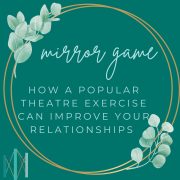

This is a guest post from one of our therapists, Julie Peters, about her experience working in theatre and how we might apply a common exercise for actors to improving our relationships. The Mirror Game can be used therapeutically to create empathy. Mirroring offers a variety of benefits, which Julie explores for us here. If you’d like to learn more about working with Julie as a therapist, you can find out how to contact her from this interview she did with us.
Through the Mirror: A Blogpost by Julie Peters
“Behavior is the mirror in which everyone shows their image.” Johann Wolfgang von Goethe
Before I became a mental health professional I was a professional theatre artist. I spent many years studying how to be an actor and how to create interesting and believable characters that could spring to life from the pages of a script. Any seasoned theatre professional will tell you that one of the best places to begin to understand the art of acting is to learn how to observe other human beings.
Observation is the best teacher of human behavior
The art of acting is about learning to play a character’s behavior. To really observe people, one has to pay very close attention to a myriad of details. Human behavior is complex; it involves the way we move our bodies, our facial expressions, the tone of our voices, when we speak and when we stay silent, how quickly we move, how loudly or softly we move and speak, etc. Five minutes of observation of one individual’s behavior is likely worth an entire written biography of this same person.
After the observation process concludes, most actors then go through extensive training to condition their bodies to practice imitating and implementing the pieces of information they gain through observation and this is why most actors have extensively practiced what is known as the “Mirror Game”. This training exercise involves standing and facing a partner and replicating this partner’s physical actions while imagining oneself to be a “mirror” for the other person.
So what does the theatre mirror game have to do with mental health?
As it turns out…EVERYTHING…! There are a growing number of researchers who are looking into the “Mirror Game” as more than a training exercise for artists. Psychology professionals are taking a closer look at how the practice of mirroring can yield valuable insight into our mental health and how this very game might be key in helping us heal our relationships and improve our cognitive abilities.
Therapeutic benefits of the mirror game:
1) It can build empathy and a deeper understanding of our relationships.
2) It can predict our challenges in our attachment styles and can in turn teach us how to heal:
3) The Mirror Game might help improve our cognitive and emotional states as we age.
Mirroring in Therapy
Mental health professionals use mirroring too. We will sometimes recreate the expression and tone of voice of our clients to help us better attune to their emotional states which can help give us a better sense of their experiences. Sometimes we will repeat our clients’ words in order to amplify what they have just said because it contains valuable insight.
How to Use The Mirror Game to Improve Relationships
Let’s take a closer look at how to implement “The Mirror Game” into our every day relationships with friends, family, and co-workers: Here are a few things to try:
1) When parenting/educating/playing with children and teens try a few minutes of “The Mirror Game”. See how you might better understand the perspective of the young people in your life after playing this interactive game.
2) When having an intimate conversation with a partner/spouse/close friend try mirroring her/his body language and observe what changes in the conversation. It is likely that making this adjustment will create a deeper understanding of the other person’s point of view, and it is likely to bring about more understanding of the common ground you share.
3) The next time you are feeling frightened of a task or new experience, try mirroring the body language of a celebrity or character that is known for having confidence. How does this impact your fear or insecurities? You likely will experience a confidence boost yourself.
Observation and Empathy Building
The years I spent learning how to be an actor definitely led me to becoming a mental health clinician. Observing the behavior of the folks around me is deeply interesting to me. I’m grateful that I have had the opportunity to practice “The Mirror Game” so many times because each encounter with learning to attune to another human being has provided me with a more empathic world view, and I encourage all of us to try this skill.





